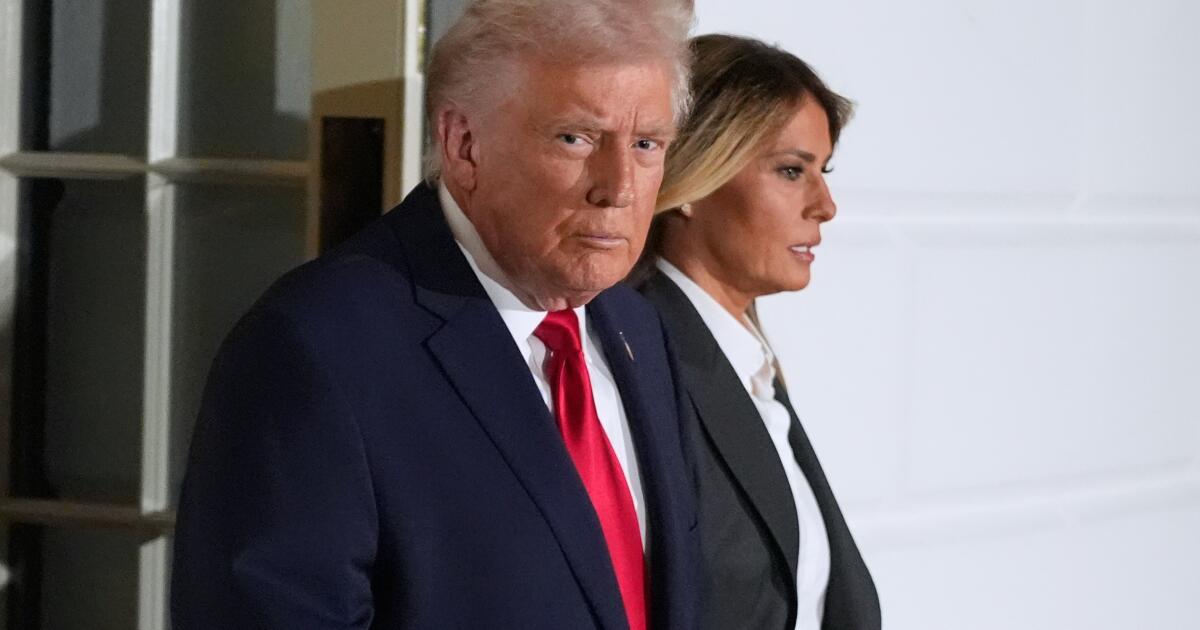Trump heads to Texas, where 3 supporters are battling it out in the Senate Republican primary
WASHINGTON — President Trump just can’t seem to choose among friends in the Texas Senate Republican primary.
So when he travels to the state on Friday for his first post-State of the Union trip, where he plans to promote his energy and economic policies, Trump will have all three candidates in the competitive race join him — just days before his party casts ballots in the primary race.
Sen. John Cornyn is battling for his fifth term and is being challenged by state Atty. Gen. Ken Paxton and Rep. Wesley Hunt in a primary fight that has become viciously personal. And all three men, missing the coveted endorsement from Trump, have been trying to highlight their ties to him as they ramp up their campaigning ahead of Tuesday’s vote.
For his part, Trump will be seeking to ride the message of his State of the Union address from Tuesday, where he declared a return to economic prosperity and a more secure America — two centerpiece arguments for Republicans as they campaign to keep their congressional majorities this fall.
Trump’s hesitation to endorse in the Texas Senate primary speaks to the tricky dynamics of the race.
Cornyn is unpopular with a segment of Texas’ GOP base, in part for his early dismissiveness of Trump’s 2024 comeback campaign and for his role in authoring tougher restrictions on guns after the 2022 school shooting in Uvalde, Texas. But Senate GOP leadership and allied groups see Cornyn as the stronger general election candidate, in light of a series of troubles that have shadowed Paxton.
Paxtonbeat impeachment on fraud charges in 2023, and has faced allegations of marital infidelity by his wife, state Sen. Angela Paxton.
Senate Majority Leader John Thune and South Carolina Sen. Tim Scott, chairman of the National Republican Senatorial Committee, have urged Trump to endorse Cornyn. They and allied campaign groups argue that the seat would cost the party hundreds of millions more to defend with Paxton as the candidate.
“It is a strong possibility we cannot hold Texas if John Cornyn is not our nominee,” Scott told Fox News on Wednesday.
Hunt, a second-term Houston-area representative, was a later entry to the race, but claims a kinship with Trump, having endorsed him early in the 2024 race. Hunt campaigned regularly for Trump and earned a prime-time speaking slot at the Republican National Convention in Milwaukee.
If no candidate reaches 50% in Tuesday’s primary, the top two finishers will advance to a May 26 runoff.
Cornyn’s campaign and a half-dozen allied groups have poured more than $63 million into the race since last fall, chiefly trying to slow Paxton but recently attacking Hunt in an effort to keep him from making it to the runoff.
Earlier this month, Trump feinted toward weighing in on the race when he said he was taking “a serious look” at endorsing in the Texas primary. He has since reaffirmed his neutrality.
Still, you wouldn’t know it from watching TV in Texas. Cornyn has been airing ads since last year touting his support for Trump’s agenda, even though his relationship with the president has been cool at times. Paxton and Hunt both have ads airing now featuring them standing with Trump.
“I like all three of them, actually. Those are the toughest races. They’ve all supported me. They’re all good. You’re supposed to pick one, so we’ll see what happens. But I support all three,” Trump said earlier this month.
The GOP battle comes as Democrats have a contested primary of their own in Texas between state Rep. James Talarico, a self-described policy wonk who regularly quotes the Bible, and progressive favorite U.S. Rep. Jasmine Crockett.
Trump hasn’t been shy about wading into other contested Republican primaries in the state. Parts of Corpus Christi fall within Texas’ 34th congressional district, where former Rep. Mayra Flores is fighting to reclaim her seat against the Trump-endorsed Eric Flores. (The two are not related.) The winner of the primary will face off against Democratic Rep. Vicente Gonzalez, long a target of the GOP, whose district was redrawn to make it easier for a Republican to win.
Eric Flores will be at the Trump event at the Port of Corpus Christi, which technically is located in a neighboring district.
Elsewhere in the state, the president has also endorsed Rep. Tony Gonzales, who is fighting calls from his own party to resign from Congress after reports of an alleged affair with a former staffer who later died after she set herself on fire. Gonzales is refusing to step down and has said that there will be “opportunities for all of the details and facts to come out” and that the stories about the situation do not represent “all the facts.”
Gonzales is facing a primary challenge from Brandon Herrera, a gun manufacturer and gun rights influencer who Gonzales defeated by fewer than 400 votes in their 2024 runoff. The White House did not return a request for comment on Thursday on whether Trump stands by his endorsement of Gonzales.
Kim and Beaumont write for the Associated Press. Beaumont reported from Des Moines, Ia. AP writer Jonathan J. Cooper in Phoenix contributed to this report.
